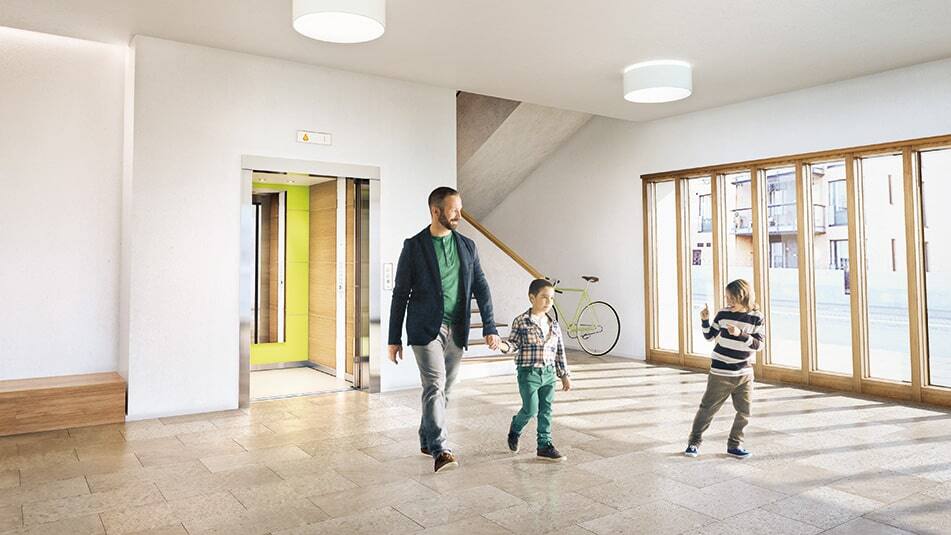Are you interested in KONE as a corporate business or a career opportunity?
Corporate site28 September 2022
As energy prices soar in Europe and the climate crisis deepens, the need to save energy is more pressing – and more glaring – than ever. Luckily, whether you’re a facilities manager, developer, or if you live in a building with an elevator, there are steps both big and small that we can all take to reduce energy demand, many of which can be done quickly and without having to overhaul your entire building.
Read our ten energy-diet tips to find out how to increase your building’s efficiency and trim down your energy consumption!

1. Boost energy efficiency with a quick-fix checklist
Not all energy-saving strategies require long-term planning or a huge budget. Instant savings can be achieved through simple measures such as harvesting daylight, adjusting room temperature and ventilation, replacing window caulking, preventing drafts with weatherstripping, adding insulation, and remembering to turn off lights and electronic devices when they are not in use. Picking off these low-hanging fruit could save you money quickly and easily.
2. Not using it? Switch it off!
In offices and other public spaces, areas such as conference rooms, toilets and storage facilities might end up unoccupied for lengthy periods. Occupancy sensors can detect human presence and automatically switch off lights, heating, and ventilation when they are not needed. Or think: What parts of the building could be switched off for the weekend? Could an entire floor be shut down for the winter months?

3. Switch to standby
Have you ever visited a shopping mall or public building and wondered how much power is wasted by escalators and autowalks that are constantly running even when nobody is using them? Reduced speed and standby mode can create significant energy savings. KONE has a long history of helping our customers reduce their energy and carbon footprints, and our EnerCal tool is a great way of identifying how to optimize your elevators, escalators, and autowalks, cutting energy and costs.
4. Save money with smart building controls
Automation is a huge comfort factor in our daily lives, but it can also help our homes and offices be more energy efficient. Smart technology makes up for human forgetfulness by turning off lighting and adjusting heating, ventilation, and air-conditioning (known as HVAC) as needed, ensuring that electricity isn’t being wasted when no users are around. Energy efficient features, such as the KONE EcoDisc® motor, regenerative drive, smart electrification, and standby mode, make a big contribution to low-carbon building operations.
5. See the LED light
There are countless old elevators in use around the world with halogen lights powered on all day and night even when the equipment is not in use. A simple fix such as switching to LED lights combined with dimmers, timers, or occupancy sensors is a highly effective energy saver.

6. Keep future bills down with preventive maintenance
All equipment should be inspected, cleaned, and serviced regularly to ensure that it is functioning as designed and not wasting energy. Fatigued parts and mechanical friction in an elevator or escalator, for example, will make your system work harder, squandering valuable energy. Regular visits from a KONE technician will prevent costly wastage. Better yet, have your equipment monitored remotely with KONE 24/7 Connected Services, which helps predict potential energy-intensive breakdowns before they happen. As well as smoother functioning and efficiency, you’ll also gain peace of mind.
7. Take the stairs!
Elevators are an essential lifeline for the elderly and people with limited mobility, but for others – if you aren’t carrying heavy bags or pushing a stroller – the healthiest sustainability action in a low-rise building is to take the stairs! KONE supports customers by providing energy calculations and People Flow® layout consultation. Don’t hide your staircase in a dark corridor – make it inviting and motivate people to save energy in a fun, healthy way.

8. Save energy by modernizing old equipment
Modernization is a lasting solution for building owners looking to achieve substantial, long-term savings. Did you know that elevators and escalators account for up to 10% of a building’s total energy consumption? By updating with the best available technology, you can achieve considerable energy savings. For instance, KONE’s most-sold elevator, the MonoSpace® 500, is up to 90% more energy efficient than its 1990s counterparts.
9. Regenerate energy
Energy regeneration – harnessing wasted energy – is one of the single most effective ways of saving energy. In a mid-rise building, KONE regenerative drives can recover 20-40% of an elevator system’s total energy consumption. In taller buildings, the energy savings can be even bigger. When an old-fashioned elevator brakes, it generates mechanical energy that heats up your shaft like a toaster. By installing regenerative drives, this wasted energy is recaptured as electricity and can be used for lighting and other purposes.

10. Choose innovations like KONE UltraRope®
With the industry’s widest range of best-in-class energy-efficient solutions, keeping our customers’ electricity bills down has long been close to our heart at KONE. One way we do this is with pioneering innovations such as our super-light KONE UltraRope®. This game-changing technology weighs about a fifth of conventional steel rope and delivers unparalleled energy efficiency, leading to an energy saving of around 15% on a 500-meter elevator journey.
As more governments and companies get behind the decarbonization agenda, we are witnessing a slow but radical transformation in the way buildings are designed and built. During this transition to more sustainable ways of building and living in cities, we all have our part to play in making sure the spaces we use in our everyday lives make the best possible use of energy.

